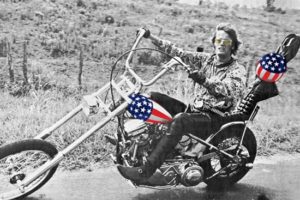 Is “Easy Rider” still relevant? I was pretty sure that, 50 years after the movie’s release, the answer would be no. But Peter Fonda had just died and I was home one night with eyes too tired to read, so I decided to see if the counterculture classic might be streaming somewhere. I found it on Amazon Prime. It wasn’t one of their free offerings but I figured $3.99 was a small price to pay for a night’s entertainment and perhaps a newspaper column.
Is “Easy Rider” still relevant? I was pretty sure that, 50 years after the movie’s release, the answer would be no. But Peter Fonda had just died and I was home one night with eyes too tired to read, so I decided to see if the counterculture classic might be streaming somewhere. I found it on Amazon Prime. It wasn’t one of their free offerings but I figured $3.99 was a small price to pay for a night’s entertainment and perhaps a newspaper column.
I’m certain I didn’t see “Easy Rider” when it came to theatres in 1969. It was rated R and my conservative parents wouldn’t consider taking 14-year-old me to watch a movie about long-haired hippies riding souped-up motorcycles across the country. Especially one reportedly filled with drugs, nudity, profanity and violence.
I remember vividly a supper table conversation Mother and Daddy had with my Uncle William, who had seen the movie. (Looking back, I believe my nascent political opinions were shaped in a wonderful way by this wonderful uncle. He despised Richard Nixon and that says it all.) Uncle William was incensed not by the fact that, in “Easy Rider,” Peter Fonda and Dennis Hopper and Jack Nicholson were stoned on marijuana or drunk on whiskey most of the time. He didn’t care that they wore their sideburns long and rarely shaved or bathed. It didn’t matter to him that they visited a commune or a house of prostitution.
What enraged him was how they died. “It was senseless,” Uncle William said. “Absolutely senseless.”
I saw “Easy Rider” for the first time about 30 years ago, on a videotape I rented from Blockbuster. There was a lot I’d forgotten between then and last week. I knew the movie opened with a lucrative cocaine deal in the Mexican desert. I knew that Wyatt (Peter Fonda) and Billy (Dennis Hopper) were going to hop on their choppers and head out across the beautiful, desolate southwest, hoping to make it to New Orleans in time for Mardis Gras. I knew I’d get to hear “Born to be Wild” and “The Weight” (Take a load off, Fanny, take a load for free) and—best of all—“Don’t Bogart That Joint, My Friend.” I knew that the tank of Wyatt’s motorcycle, “Captain America,” his helmet (which he seldom wore) and his leather jacket were decorated with the stars-and-stripes.
Controversial then, controversial now.
But I didn’t remember much about the bikers’ stop at a desert commune, where they watched clueless “famers” toss seeds into dirt that would never grow food. Later, our travelers went skinny-dipping with two free-spirited women they’d just met. (“Are you a Pisces?” one of the women asked Wyatt, who nodded. “I thought so!” she exclaimed.) I didn’t remember why they ended up in a jail cell in New Mexico with Jack Nicholson. (The answer? Joining a parade without a license.) I didn’t remember how often they used the terms “man” and “dude” and “groovy.” (Constantly.)
But I did remember the way the rednecks in a café in small-town Louisiana harassed them while they ate and what those same cowards did to them while they slept. I remembered Wyatt and Billy’s horrifying trip on LSD in a cemetery in the French Quarter. And who can forget the iconic last scene, where two local-yokels in a pick-up truck decide to “scare” them with a shotgun while they’re innocently riding down the highway?
“What they did to those boys was senseless,” my dear Uncle William said 50 years ago. “They killed them because they looked different and thought different and lived different. No other reason.”
Is “Easy Rider” still relevant? You bet it is.
(August 25, 2019)